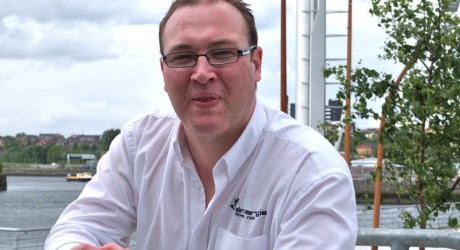FITNESS giants, Energie Scotland, plan to more than double the number of centres under their brand across the country within the next six months, it was announced during Scottish Franchise Week.
The chain, which was launched in Scotland five years ago by businessperson, David Weir, and his business partner, Matt Roberts, already turns over around £6million per annum with nine health clubs as far a field as Oban, Glasgow. Inverness, Montrose and Dundee.
Now, the plan is to add a further 13 by the end of 2011.
Weir, a 31 year-old former marketing and PR executive, changed careers when he spotted a gap in the market for affordable fitness centres and made contact with Energie – the UK fitness club franchise business with 93 clubs and 75,000 members across the UK, Ireland, Latvia and the Middle East.
“I fancied working in the health and fitness sector so I Googled ‘fitness franchising’ and Energie came up, but I noticed they had no clubs in Scotland so I went down and spoke to their Head Office in London,” said David, who is now managing director of Energie Scotland.
He and his partner Roberts started by buying the ex-Bannatyne’s Health Club in Dundee, part of the chain started by Dragons Den star, Duncan Bannatyne.
In growing the business, Weir has expanded the portfolio to span four brands and target all sectors, from women only and youth specific gyms aimed at five to 18 year-olds to full-format family health clubs and budget no frills facilities.
“We also have one club in Perth which is in the process of relocating,” said Mr Weir whose organisation currently employs around 110 staff throughout Scotland.
“When we were getting started we benefited hugely from the experience of Energie,” said Mr Weir.
“Running the kind of gym group that we do is not a nine-to-five business. Whether you are a club owner or a manager our clubs are open from 6am in the morning to 10pm at night and we only shut for two days a year. It’s hard work, but enjoyable.”
Despite the recession Energie Scotland has seen gym attendance grow to around 13,000 members while many of its competitors have reported falling rolls.
“There is still demand for good quality gyms at a reasonable cost. The sector is very price sensitive. While a lot of places are charging £60 a month or more for membership we charge £35 or less, that’s a big saving,” said Weir.
One of the main reasons Energie Scotland is able to be so competitive is that it has the support of a much larger network.
“Franchising is a real growth industry and the number of brands and franchises has continued to grow steadily over the years.” said Tom Endean, a spokesperson for the British Franchising Association, organizers of Scottish Franchise Week sponsored by Lloyds TSB Commercial and whichfranchise.com.
“Part of this is a result of the robust nature of the franchising model. The ability to operate as a local business with understanding and commitment to the area and people, combined with the national support systems and brand, has allowed many franchises to remain viable, secure and successful businesses even in tough times.”
Figures show that while many industry sectors suffered during the recession around 90 per cent of franchisees reported a profit, including 80 per cent of those in their first two years of operation.
Energie Scotland plans to capitalise on the support of the national network to expand across Edinburgh, Glasgow, Hamilton, Tayside, East Kilbride, Airdrie and Elgin in the next quarter.
“There are so many pitfalls setting up a business that the support and guidance available from a franchisor is invaluable. Now we give the same help to our franchisees. The buying power we’ve created is one of the main things that has allowed us to be successful,” added Weir.
“If I wanted to kit out a gym with new equipment on my own I couldn’t afford to pay the retail price but Energie receive a huge discount because they spend millions of pounds a year on equipment.
“We benefit from the groups’ spending power right down the line, whether it’s buying health supplements or electricity. Energie has brokers who instead of buying for one person will buy for the whole group. Those reductions in costs alone are enough for me to justify being a franchisee before even considering the support structure.”
ENDS
Notes to Editors:
For more information on franchising please visit www.thebfa.org or contact Peppercorn PR on 0845 217 8757 to arrange interviews with members of the bfa and Scottish Franchise Forum.
About The British Franchise Association (bfa):
The bfa is the voluntary self-regulating governing body for franchising formed in 1977 by the major franchising organisations looking to accredit and promote those franchise systems that meet the strict ethical and business criteria of a good franchise.
The term, ‘franchising’, has been used to describe many different forms of business relationships, including licensing, distributor and agency arrangements. The more popular use of the term has arisen from the development of what is called ‘business format franchising’.
Business format franchising is the granting of a license by one person (the franchisor) to another (the franchisee), which entitles the franchisee to trade under the trade mark/trade name of the franchisor and to make use of an entire package, comprising all the elements necessary to establish a previously untrained person in the business and to run it with continual assistance on a predetermined basis.
The bfa hold a full list of all of its members and the code of ethics to which these members subscribe to on its website: www.thebfa.org
MEDIA RELEASE posted by Peppercorn PR. You too can post media releases (aka press releases) on allmediascotland.com. For more information, email here.
Contact: Peppercorn PR
Phone: 0845 217 8757
Email: news@peppercornpr.com
Website: http://www.thebfa.org






